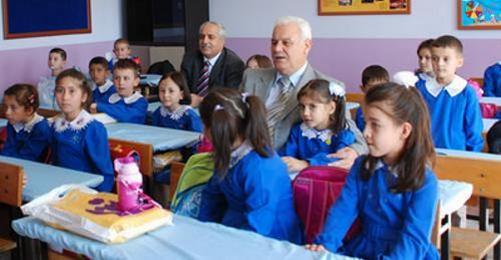HUMAN RIGHTS IN EDUCATION
Anti-Discrimination and Equality Highlighted in Turkish Schools

National Education Minister Nimet Çubukçu published a circular regarding anti-discrimination lessons in Turkish primary and secondary schools scheduled for the first week of the academic year 2009/2010 starting at the end of September. The lessons include topics such as abolishment of discrimination, tolerance and gender equality.
In the primary education (1st to 8th grade) class teachers and subject teachers will hold the lessons.
In the secondary schools the lessons will be taught by subject teachers, members of the school management and the student advisors.
When going through the topics in class Çubukçu wants the connection to daily life being emphasized in particular. Additionally, he drew attention to relevant websites of state institutions that can be used as sources for the teachers such as the Status of Women General Directorate (KSGM), the Administration Head Office for the Disabled (ÖZİDA), the Social Services and Child Protection Agency (SHÇEK), the Family and Social Research General Directorate and the Human Rights Presidency (İHB).
Definition of discrimination
Çubukçu defined discrimination in his circular as follows:
"Discrimination means treating somebody badly or humiliating a person because of his language, religion, gender, race, political opinions, philosophic beliefs or physical differences. Focal points of discriminating behavior are Othering, exclusion, rejection and humiliation. Discrimination due to social, cultural and economic reasons continues in forms such as gender inequality, discrimination of the disabled, racism or intolerance".
The reasons for the circular were explained by Çubukçu as below:
"It is one of the state's most important duties to take responsibility. This can be done by organizing the necessary arrangements and by increasing our efforts to let everybody equally benefit from the individual rights and individual freedom that have emerged from today's society. The existence of individuals not benefiting equally from economic, social and legal opportunities and instead being exposed to discrimination is also one of the most important problems in today's globalized world. In order to minimize problems related to discrimination and in order to live in a world ruled by equality, justice and peace, individuals, institutions and simply all sectors of society carry an important responsibility".
Teachers Unions concerned about implementation of the lessons
Bianet asked the Turkish teachers unions Education and Science Workers Trade Union (Eğitim-Sen), Association of Educator's Union (Eğitim Bir-Sen), Education and Science Union (Eğitimİş) and Turkish Education Union (Türk Eğitim-Sen) to give their opinion about Minister Çubukçu's plans. Despite some objections all unions evaluate the anti-discrimination lessons positively.
Eğitim-Sen appreciates the circular. Yet, chairman Zübeyde Kılıç emphasized that the actual focus has to be laid on the elimination of the origins of discrimination in education.
Also Eğitimİş approves of the circular's contents over all. Though chairman Yüksel Adıbelli criticized Çubukçu's connection made between the circular and the government's "democratic initiative".
Eğitim Bir-Sen evaluated the circular positively as well. General secretary Halil Etyemez sees the need to take one step further and suggests to implement the concept of the lessons' contents into the entire educational process.
Türk Eğitim-Sen approved of the parts regarding gender equality and the disabled. Nevertheless, chairman İsmail Koncuk added: "There was no discrimination against cultures in Turkey and in the history of the Turkish nation". Thus, he refused the sections relevant to ethnic, cultural and religious discrimination. According to Koncuk, the teachers are equipped and prepared well enough for the lessons. But he voiced his doubts concerning the other unions' applications. (TK/VK)
KURDISH QUESTION
PKK Ceasefire to be Terminated on 31 October?

KCK CASE
Court Dismissed Request for Defence in Kurdish

7th Istanbul Gathering for Freedom of Thought

CONSTITUTIONAL AMENDMENTS
58 Percent Said "Yes" to Constitutional Reform Package

Rights Organizations 3 Years ahead of Foreign Minister







